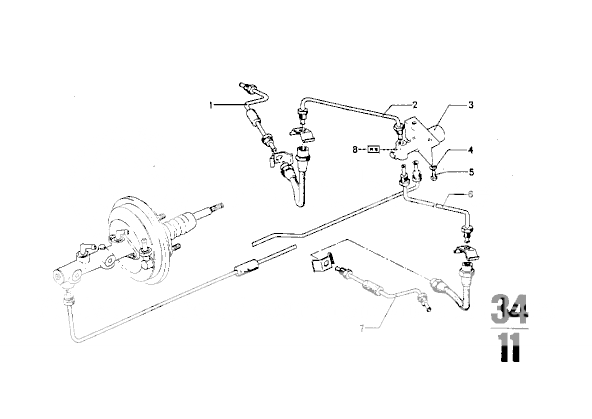thehackmechanic
Well-Known Member
I've been trying to sort out the brakes on this Tundra '73. It had terribly soft brakes and a seized rear caliper. I replaced the caliper. I then used my brand-new pressure bleeder to change the fluid, as the car had been sitting for 3-4 years. After bleeding, the brake pedal was better, but still soft, so I bled it again, and there was no change. I bled it a third time, again no change.
I then replaced all six rubber brake lines with new ones and bled it, and the pedal is still soft. I bled it again, no change. So it's had five bleedings. I'm sure I've run four quarts of brake fluid through it at this point.
Each time I bleed it, I'm doing master cylinder, then right rear, left rear, right front, left front, all with the pressure bleeder between 10 and 15psi. When bleeding the master, I crack open each of the five threaded lines for perhaps 30 seconds and let it seep onto a paper towel. On the front calipers, I'm bleeding upper nipple, then the nipple alone on its own side, then the nipple opposite that. I get good flow out of all of the nipples on all of the calipers, and let the fluid flow for a full minute.
If I pull the top off the reservoir so I can watch the level, it goes down between 1/8" and 1/4" when I stomp on the brake pedal. I've always associated a moving level with air in the line, as air is compressible but fluid is not. The level doesn't move when I hit the clutch pedal.
The pedal feels pretty firm if I stomp on it when the engine isn't running, but feels mushy when I run the engine.
I'm not seeing any brake fluid in the big vacuum boost hose.
I don't know how to bleed this thing any more, or any better. Am I missing something with bleeding the master? Or is the conventional wisdom that, at this point, the master cylinder is suspect?
--Rob
I then replaced all six rubber brake lines with new ones and bled it, and the pedal is still soft. I bled it again, no change. So it's had five bleedings. I'm sure I've run four quarts of brake fluid through it at this point.
Each time I bleed it, I'm doing master cylinder, then right rear, left rear, right front, left front, all with the pressure bleeder between 10 and 15psi. When bleeding the master, I crack open each of the five threaded lines for perhaps 30 seconds and let it seep onto a paper towel. On the front calipers, I'm bleeding upper nipple, then the nipple alone on its own side, then the nipple opposite that. I get good flow out of all of the nipples on all of the calipers, and let the fluid flow for a full minute.
If I pull the top off the reservoir so I can watch the level, it goes down between 1/8" and 1/4" when I stomp on the brake pedal. I've always associated a moving level with air in the line, as air is compressible but fluid is not. The level doesn't move when I hit the clutch pedal.
The pedal feels pretty firm if I stomp on it when the engine isn't running, but feels mushy when I run the engine.
I'm not seeing any brake fluid in the big vacuum boost hose.
I don't know how to bleed this thing any more, or any better. Am I missing something with bleeding the master? Or is the conventional wisdom that, at this point, the master cylinder is suspect?
--Rob
Last edited:

